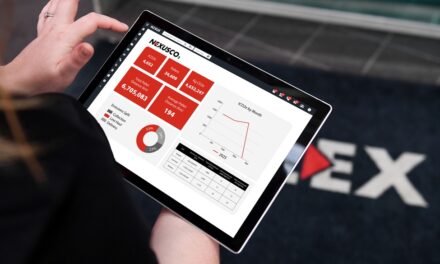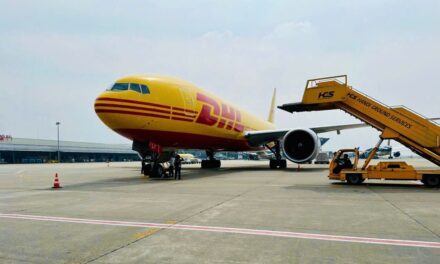
UPS will have no presence at local hub
A spokesperson for United Parcel Service (UPS) said Friday the shipping giant will “unequivocally” not use the Wilmington hub in any way if an agreement with DHL is inked.
Norman Black, director of global media services, talked to the News Journal Friday from the UPS headquarters in Atlanta, Ga.
“Anything involving the future of that hub in Wilmington has got to be addressed to DHL. It’s their facility, their operation, their network, the thing that they’re changing. The only thing I can tell you unequivocally, is no, UPS is not planning on doing anything in Wilmington,” Black said.
He mentioned it was discussed at the press conference last week in Bonn, Germany, that if UPS is hired to take over DHL’s air transport, the agreement implicitly states it is based on using UPS’ existing air network.
The agreement may mean the direct loss of at least 8,200 employees in the southwest region of Ohio, according to local and state of Ohio public officials.
UPS and DHL announced the two major transportation companies are in talks over a 10-year agreement worth USD 1 billion annually.
UPS has six hubs, with the main global hub at Louisville, Ky. and other hubs in Ontario, Calif.; Dallas, Texas; Rockford, Ill.; Columbia, S.C.; and Philadelphia, Penn.
Black foresees no new information being available for two to three months while lawyers in the United States and Germany work behind the scenes on a final contract. After that is complete, the companies will build an operational plan. A spokesperson for United Parcel Service (UPS) said Friday the shipping giant will “unequivocally” not use the Wilmington hub in any way if an agreement with DHL is inked.
Norman Black, director of global media services, talked to the News Journal Friday from the UPS headquarters in Atlanta, Ga.
“Anything involving the future of that hub in Wilmington has got to be addressed to DHL. It’s their facility, their operation, their network, the thing that they’re changing. The only thing I can tell you unequivocally, is no, UPS is not planning on doing anything in Wilmington,” Black said.
He mentioned it was discussed at the press conference last week in Bonn, Germany, that if UPS is hired to take over DHL’s air transport, the agreement implicitly states it is based on using UPS’ existing air network.
The agreement may mean the direct loss of at least 8,200 employees in the southwest region of Ohio, according to local and state of Ohio public officials.
UPS and DHL announced the two major transportation companies are in talks over a 10-year agreement worth USD 1 billion annually.
“If this deal gets done,” Black explained, “it makes economic sense to both sides. Again, DHL’s CEO called this a win-win for both companies and the reason he did that is because even with revenue up to USD 1 billion a year, DHL is taking advantage of that existing network infrastructure that UPS has and the fact that there’s capacity in that existing structure to take on their volume. Just to be very clear, there is no contemplation by UPS of adding additional hubs to our network.”
UPS has six hubs, with the main global hub at Louisville, Ky. and other hubs in Ontario, Calif.; Dallas, Texas; Rockford, Ill.; Columbia, S.C.; and Philadelphia, Penn.
“While I certainly understand the issue that you’re raising in terms of the DHL/ASTAR/ABX Air jobs in Wilmington, that is an issue for DHL. That Wilmington facility is not something that figures into our network plans at all,” he said.
Black foresees no new information being available for two to three months while lawyers in the United States and Germany work behind the scenes on a final contract. After that is complete, the companies will build an operational plan.
“Hopefully, we’ll be able to discuss a lot more detail about what we’ll actually be doing for DHL and how we’ll do it. Until we’ve got that signed contract, there’s not much I can say at this point,” he said.
He dismissed claims there could be anti-trust issues at play in the arrangement, something which Gov. Ted Strickland said the state’s lawyers would be investigating and which Congressman Michael Turner also has questioned.
“The lawyers for the two companies who have explored this issue do not believe there are any anti-trust issues at all,” he said. “Once it is completed, it is going to be a straight commercial-vendor relationship. It’s not a partnership. It’s not a joint venture. We’re not going to be in any way delivering or picking up packages from customers.
“It literally is an airline haul agreement, very similar to what we do today for the United States Postal Service and which, by the way, Fed Ex does the same thing,” he added. “Our lawyers do not see any anti-trust issues at all given what we’re going to be doing.”
The attraction for UPS is pretty clear, he said. The agreement would allow a more efficient use of their existing system while gaining a “very large and profitable revenue stream.”
It remains to be seen whether this agreement will fix the hemorrhaging of money DHL has encountered since trying to enlarge its presence in the U.S. market in 2003 when it acquired Airborne Express.
Last year, DHL reported losses last year of USD 900 million. Before the restructuring was announced, the company reported an expected loss of USD 1.3 billion for this year.
Black said until an operational plan is in effect, he does not have a number for how many DHL packages would be handled annually by UPS. He said UPS delivers an average of 15.8 million packages every day around the world.
“We’re the largest package delivery company in the world,” he noted.
Some have questioned why DHL announced the planned agreement before a contract was a done deal with UPS.
While he said he cannot speak for DHL, Black responded, “DHL had set a schedule for announcing to the press and to the world how they were going to restructure their entire North American business. They set that schedule and I have no idea how they set that schedule, but obviously as they were making their decisions about how they were going to restructure their business, this was one part of it.
“Having made a decision that they wanted to hire us as their air transport vendor to replace the two airlines that they use today even though the contract is not finalized, they made that decision and decided they wanted to announce it as part of their broader decision,” he said.
Bringing DHL’s expected air volume on board with UPS’ existing volume would create the need for new jobs at UPS, Black said. While Louisville is the company’s main global hub, he expected the jobs would probably be spaced out among the six hubs nationwide.
“Absolutely,” he said. “And it wouldn’t be just at those six air hubs necessarily because we have hubs, as in we have air gateways. Potentially, if this is finalized, they could be tendering volume to us to carry at literally any air gateway or hub in the United States. Anytime we get more packages, that requires additional people and creates more jobs. Again, because there’s no contract and because the operational plan hasn’t been done, there’s no way I or DHL or anybody else can try to predict how many new jobs, but there absolutely will be jobs created.”
Black said even if the contract is signed in the next two to three months, a big movement of volume would not be seen until probably the second half of 2009. Annual revenue for UPS is approximately USD 50 billion.












